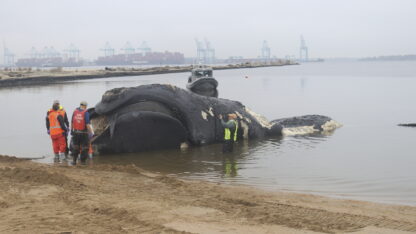Deputy Director of Watershed Management Maria Hayes gave a lengthy presentation about fixing DeKalb County’s water system to the Public Works and Infrastructure committee in a special called meeting on May 22.
The comprehensive presentation closed with a preview of high-level spending options the county can use to improve its water system in order to improve service reliability. Replacing all pipes that will be 70 years old by 2050 will cost the county roughly $4.4 billion.
Noting recent main breaks and service failures in the McLendon Drive area, Hayes began the presentation with the history of the water system beginning with the first pipes being installed in 1909.
Graphs showed how the population of DeKalb is eight times greater than in 1940 when the key infrastructure was installed. Several vital parts of the system still use infrastructure built in 1940, whether it be transmission lines or even parts of the one water treatment plant servicing DeKalb County.
Currently, DeKalb County gets all of its water from the Chattahoochee River. From there it travels to the Scott Candler Water Treatment plant, and then out to consumers via major transmission lines, likened to the highway system, with large transmission mains branching off into smaller pipes that bring the water to the public. According to the report, 46% of these smaller pipes are made of out-of-date materials.
The larger transmission mains are major arteries that carry roughly 35% of the system’s flow, but despite population growth, DeKalb has not installed a new one in over 50 years.
Some are still newer than the oldest pipes in the system, but another complicating factor said Hayes is that, “From 1970 to 1972 the manufacturers of the pre-cast concrete (PCCP or PCC pipes), whatever formula or methodology they were using is causing these pipes to degrade prematurely.
“We are having to address 1970s era pipe, before pipes from the ’40s, ’50s and ’60s because of this degradation.”
A recent McLendon Drive main break was one of these PCC pipes.
The presentation also noted that DeKalb is the only metro Atlanta county of similar size served by only one water source and one water treatment plant.
The county is also on a ridge, so pressure is added to the system pumping water up to north DeKalb. This pressure builds up when the water flows through pipes downhill to south DeKalb. This leads to many areas in the system where pipe pressures should be between 40 and 60 pounds per square inch, in some places running at 150 or even 200 PSI.
“We have an undersized system,” Hayes said. “So to meet demand, we are trying to push more water through it, which causes higher pressure areas. If you have high pressures going through old pipes… you can guess what happens.”
DeKalb currently is experiencing 33 breaks per 100 miles of pipe, a ratio higher than the median for the region 16 breaks per 100 miles.
Commissioner Robert Patrick also connected the out-of-date system to higher rents. Given the scope of the problem, DeKalb will often require developers to store water and sewage tanks on site, the extra costs of which are felt by the consumer.
The recommendations from Deputy Director Hayes were:
– Adding another 60” transmission line, which will cost the county $650 million over 25 years. This would add another artery to the system to help it better deal with increased demand. Hayes stressed that this would be a major construction project that wouldn’t be finished for a while.
– Making a $250 million investment in the Scott Candler Water Treatment Plant. This money would be spend to update the plant so it no longer relies on infrastructure built in 1940, and to add more redundancy and increase storage.
– Considering two options for spending for generally bringing older pipes up to date. It’s this endeavor that to totally complete will cost roughly $4.4 billion. For the first phase, though, the county could elect to either spend $75 million a year for 20 years or $150 million a year for 10 years. Hayes advocated for the 10-year plan, which invests more money earlier,
She said, “As you fix stuff, other stuff is getting older” and touted that a 40% reduction in breaks would occur after the 10-years of spending, which would in the long run save the county money by no longer having to spend to fix these issues as they arise.
Hayes also called for a $3 million improvement to the county water system. Comparatively, a relatively minimal expense and amount of work required since this part of the system was updated recently.
Staff will soon be asking county commissioners how they want to proceed. The current work involves meeting across multiple divisions of the county to determine how this will all be funded before asking the county commission to approve projects or allocations. County staff is also currently prioritizing component projects of these larger areas of investment.
This story was provided by WABE content partner Decaturish.










